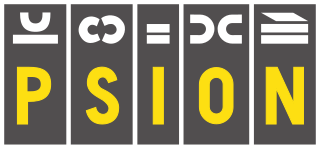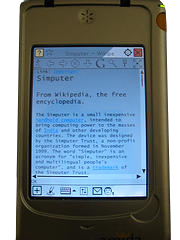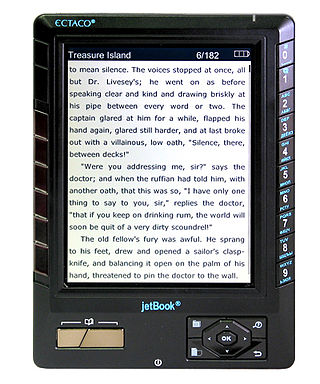Speech synthesis is the artificial production of human speech. A computer system used for this purpose is called a speech synthesizer, and can be implemented in software or hardware products. A text-to-speech (TTS) system converts normal language text into speech; other systems render symbolic linguistic representations like phonetic transcriptions into speech. The reverse process is speech recognition.

Psion PLC was a designer and manufacturer of mobile handheld computers for commercial and industrial uses. The company was headquartered in London, England, with major operations in Mississauga, Ontario, Canada, and other company offices in Europe, the United States, Asia, Latin America, and the Middle East. It was a public company listed on the London Stock Exchange and was once a constituent of the FTSE 100 Index.

Optical character recognition (OCR) is a process that converts printed texts into digital image files. It is a digital copier that uses automation to convert scanned documents into editable, shareable PDFs that are machine-readable. OCR may be seen in action when you use your computer to scan a receipt. The scan is then saved as a picture on your computer. The words in the image cannot be searched, edited, or counted, but you may use OCR to convert the image to a text document with the content stored as text. OCR software can extract data from scanned documents, camera photos, and image-only PDFs. It makes static material editable and does away with the necessity for human data entry.

The Simputer was a self-contained, open hardware Linux-based handheld computer, first released in 2002. Developed in, and primarily distributed within India, the product was envisioned as a low-cost alternative to personal computers. With initial goals of selling 50,000 simputers, the project had sold only about 4,000 units by 2005, and has been called a failure by news sources.

Palm is a line of personal digital assistants (PDAs) and mobile phones developed by California-based Palm, Inc., originally called Palm Computing, Inc. Palm devices are often remembered as "the first wildly popular handheld computers," responsible for ushering in the smartphone era.
Educational software is a term used for any computer software which is made for an educational purpose. It encompasses different ranges from language learning software to classroom management software to reference software. The purpose of all this software is to make some part of education more effective and efficient.
In-Q-Tel (IQT), formerly Peleus and In-Q-It, is an American not-for-profit venture capital firm based in Arlington, Virginia. It invests in high-tech companies to keep the Central Intelligence Agency, and other intelligence agencies, equipped with the latest in information technology in support of United States intelligence capability. The name "In-Q-Tel" is an intentional reference to Q, the fictional inventor who supplies technology to James Bond.
Conexant Systems, Inc. was an American-based software developer and fabless semiconductor company that developed technology for voice and audio processing, imaging and modems. The company began as a division of Rockwell International, before being spun off as a public company. Conexant itself then spun off several business units, creating independent public companies which included Skyworks Solutions and Mindspeed Technologies.

SpeechFX, Inc., offers voice technology for mobile phone and wireless devices, interactive video games, toys, home appliances, computer telephony systems and vehicle telematics. SpeechFX speech solutions are based on the firm’s proprietary neural network-based automatic speech recognition (ASR) and Fonix DECtalk, a text-to-speech speech synthesis system (TTS). Fonix speech technology is user-independent, meaning no voice training is involved.
Jargon Software Inc. is a computer software development company that specializes in development and deployment tools and business applications for mobile handheld devices such as Pocket PC and Symbol PDA devices.
Commercial off-the-shelf or commercially available off-the-shelf (COTS) products are packaged or canned (ready-made) hardware or software, which are adapted aftermarket to the needs of the purchasing organization, rather than the commissioning of custom-made, or bespoke, solutions. A related term, Mil-COTS, refers to COTS products for use by the U.S. military.

An electronic dictionary is a dictionary whose data exists in digital form and can be accessed through a number of different media. Electronic dictionaries can be found in several forms, including software installed on tablet or desktop computers, mobile apps, web applications, and as a built-in function of E-readers. They may be free or require payment.
Berkeley Nucleonics Corporation (BNC) of San Rafael, California, United States, is an electronics company whose products range from pulse generators and digital delay generators to specialized handheld instruments and portal monitors capable of radiation detection and isotope identification.

Paragon Software Group is a German software company that develops hard drive management software, low-level file system drivers and storage technologies. The Smart Handheld Device Division (SHDD) offers multilingual dictionaries, multilingual handwriting recognition, weather information, and two-way data synchronization with desktop devices.
Mobile translation is any electronic device or software application that provides audio translation. The concept includes any handheld electronic device that is specifically designed for audio translation. It also includes any machine translation service or software application for hand-held devices, including mobile telephones, Pocket PCs, and PDAs. Mobile translation provides hand-held device users with the advantage of instantaneous and non-mediated translation from one human language to another, usually against a service fee that is, nevertheless, significantly smaller than a human translator charges.
Telesensory Systems, Inc. (TSI) was an American corporation that invented, designed, manufactured, and distributed technological aids for blind and low vision persons. TSI's products helped visually impaired people work independently with computers and with ordinary printed materials.
Image translation is the machine translation of images of printed text. This is done by applying optical character recognition (OCR) technology to an image to extract any text contained in the image, and then have this text translated into a language of their choice, and the applying digital image processing on the original image to get the translated image with a new language.

ECTACO jetBook is a series of electronic-book reader devices developed by Ectaco. The original device was announced in the United States in October 2008.
ERM Electronic Systems ltd. Aka ERM Advanced Telematics is an Israeli electronic company focused on the design, development, and manufacture of vehicle security and GPS tracking devices for the telematics and fleet management industry. ERM Advanced Telematics has a global operation offering telematics devices for Stolen Vehicle Recovery (SVR) and Fleet Management Solutions (FMS), all incorporated within vehicle security.
JSC Ruselectronics, is a Russian state-owned holding company founded in 1997. It is fully owned by Rostec.








